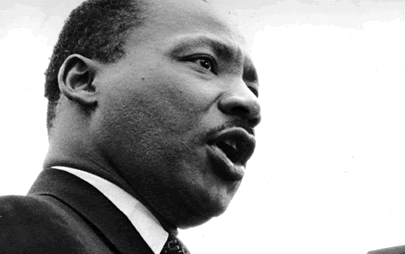Listen to Martin Luther King Jr

Dr. Martin Luther King Jr’s 1967 assertion that the moral arc of the universe is long, but bends toward justice may be his most well-known quote about the nature of time.
Drawing on the words of nineteenth-century Massachusetts abolitionist Theodore Parker, King’s phrase moved President Barack Obama so much that he had it woven into a rug in the Oval Office. In his emotional victory speech after defeating Republican opponent Roy Moore, Doug Jones invoked King’s dictum while telling his supporters they had “helped bend” the arc during his senatorial campaign.
Yet as uplifting as the quote may be, it is not the most useful guide during the Trump presidency. Instead, we should heed words King had written more than four years earlier on scraps of paper while inside a Birmingham jail cell.
King was answering “A Call for Unity,” an open letter written by eight white clergymen who made a thinly veiled reference to him while criticizing outsiders. Citing improvements in the city’s racial climate since the beginning of the year, these religious leaders called the demonstrations being led by King, longtime colleague Ralph Abernathy and legendary Birmingham minister and community organizer Fred Shuttlesworth “unwise and untimely.”
“We do not believe that these days of new hope are days when extreme measures are justified in Birmingham,” they wrote.
King took direct aim in his letter at the notion that time’s passage inevitably heals all ills. “Actually, time itself is neutral; it can be used either destructively or constructively,” he wrote. “ More and more I feel that the people of ill will have used time much more effectively than have the people of good will.”
He penned these words at a difficult point for him and the movement.
Along with Abernathy and Shuttlesworth, he had been roughly arrested on Good Friday shortly after the campaign’s start, one of 29 times he was put in jail. This meant he was again away from his wife Coretta, who had recently given birth to their fourth child.
Living every day under the threat of death from the time community leaders tapped him to assume the mantle of leadership of the Montgomery Bus Boycott in 1955 had exacted a toll on King, too. (When President John F. Kennedy was assassinated later that year, King told his wife in an eerily accurate prediction that he would not live to see his fortieth birthday.)
Birmingham’s decisive moment did not occur until early May, after movement leaders heeded James Bevel’s call to have black youth put their bodies in the way of Bull Connor’s fire hoses, batons and police dogs. The children’s bravery produced iconic images that led to worldwide condemnation. Their work also played a pivotal role in Birmingham’s leaders agreeing on May 10 to desegregate the city’s businesses and to establish a biracial committee to improve employment opportunities for Birmingham’s black community. These young people demonstrated that King was correct when he wrote in his letter to the clergymen that human progress never rolls in on wheels of inevitability, but rather comes through the “tireless efforts” of people willing to struggle for justice.
King’s words echo across the decades as we stand on the cusp of the second full year of the Trump presidency. Now 89 years old had he lived, King undoubtedly would have opposed Trump’s racially-tinged rhetoric and policies like the tax reform bill that blatantly favors our wealthiest citizens. Perhaps even more fervently, though, King would have spoken out against Trump’s dual assault on truth and our country’s democratic fabric because they were such fundamental elements of his life and work. He repeatedly invoked William Cullen Bryant’s statement that “Truth, crushed to earth, will rise again.” And from his very first speech in Montgomery in December 1955, just days after Rosa Parks’ arrest, to his final address the night before he was killed in Memphis on April 4, 1968, King declared his bone-deep love for democracy and his belief that the transformation of “thin paper to thick action is the greatest form of government on earth.”
So as we pause to reflect the life of the King who gave his life fighting peacefully to have our nation be true to the lofty ideals enshrined in our founding documents, we should read his inspiring dream and his declaration of moral arcs bending inexorably toward a more just universe. But we should also remember, and be guided by, the sobering words he wrote in jail about time’s neutrality and the need to use it constructively, as well as by the courage and ceaseless effort exhibited by the Birmingham youth who joined him in the struggle to dismantle American apartheid more than a half century ago.
By Jeff Kelly Lowenstein
Email: jkellylowenstein@gmail.com
